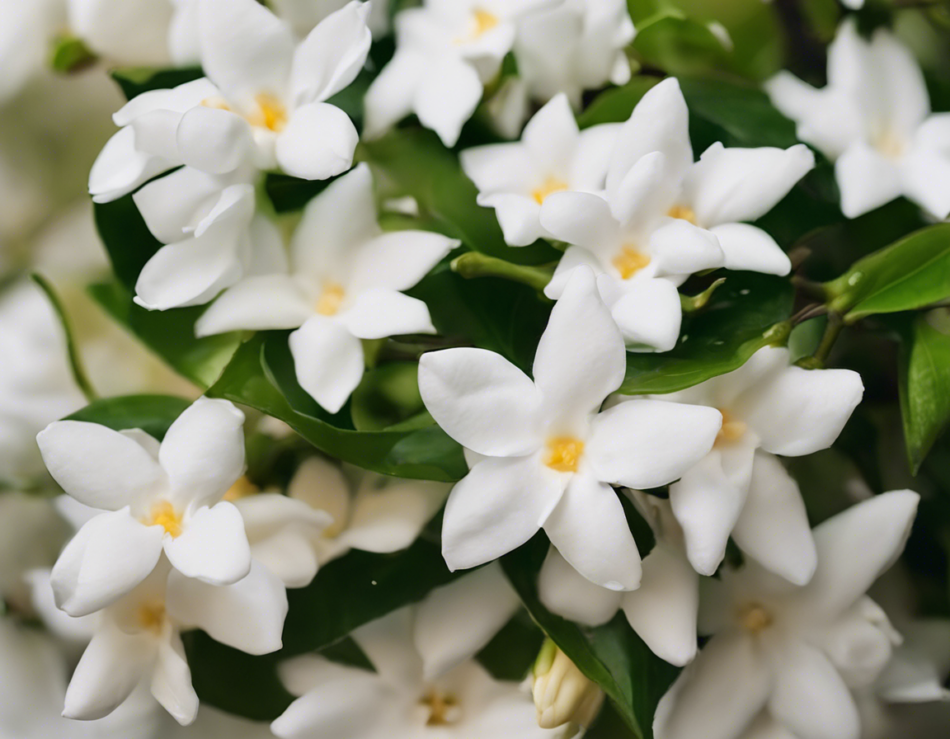Introduction
Jasmine Flowers, known for their enchanting fragrance and delicate beauty, have captivated hearts and minds for centuries. These white blossoms hold deep cultural significance in various parts of the world, symbolizing love, purity, and spirituality. Let’s delve into the beauty and symbolism of jasmine flowers and explore why they hold such a cherished place in human culture.
The History of Jasmine Flowers
Jasmine flowers have a rich history that dates back to ancient times. Originating from the Himalayas in western China, jasmine has been cultivated for over 3,000 years. The Persians were among the first to distill jasmine oil for perfumes, a practice that later spread to Egypt and Europe.
In various cultures, jasmine is associated with different meanings. In India, jasmine is revered as a symbol of love and beauty and is widely used in religious ceremonies and weddings. In Thailand, jasmine is considered a sacred flower and is often used to make offerings in temples.
The Symbolism of Jasmine Flowers
1. Love and Romance: Jasmine flowers symbolize love, romance, and sensuality. In many cultures, giving jasmine flowers to a loved one is seen as a gesture of affection and passion. The sweet, intoxicating scent of jasmine is believed to enhance romantic feelings and create a romantic ambiance.
2. Purity and Innocence: The pristine white petals of jasmine flowers represent purity and innocence. In some cultures, jasmine is used in purification rituals to cleanse the mind and soul.
3. Spirituality and Healing: Jasmine flowers are also associated with spirituality and healing. In aromatherapy, jasmine essential oil is used to promote relaxation, reduce stress, and uplift the mood. The scent of jasmine is believed to have a calming effect on the mind and body.
4. Prosperity and Good Luck: In Chinese culture, jasmine flowers are believed to bring good luck and prosperity. The delicate beauty of jasmine is seen as a symbol of abundance and wealth.
Growing Jasmine Flowers
Jasmine flowers are relatively easy to grow and can thrive both indoors and outdoors. They prefer well-drained soil and plenty of sunlight. Regular watering and occasional fertilization can help jasmine plants bloom prolifically.
Types of Jasmine Flowers
There are several varieties of jasmine flowers, each with its unique characteristics. Some popular types include:
-
Common Jasmine (Jasminum officinale): Known for its sweet fragrance, this variety is commonly used in perfumes and teas.
-
Arabian Jasmine (Jasminum sambac): Also known as “Mogra” in India, this variety has small, white blossoms and a strong, sweet scent.
-
Star Jasmine (Trachelospermum jasminoides): This variety is prized for its star-shaped, white flowers and glossy leaves.
Uses of Jasmine Flowers
Besides their ornamental value, jasmine flowers have several practical uses:
-
Perfumery: Jasmine oil is a popular ingredient in perfumes, cosmetics, and scented candles.
-
Culinary: Jasmine flowers are used to flavor teas, desserts, and rice dishes in many cuisines.
-
Medicinal: Jasmine is used in traditional medicine to treat various ailments, such as headaches, insomnia, and anxiety.
Frequently Asked Questions (FAQs)
- Are jasmine flowers easy to grow at home?
-
Yes, jasmine flowers are relatively easy to grow, requiring sunlight, well-drained soil, and regular watering.
-
Can jasmine flowers survive in cold climates?
-
While jasmine plants prefer warm climates, some varieties can tolerate cooler temperatures if protected from frost.
-
How do I harvest jasmine flowers for culinary purposes?
-
Harvest jasmine flowers early in the morning when their scent is most potent. Use them fresh or dry them for later use.
-
Is jasmine oil safe for topical use?
-
Jasmine oil is generally safe for external use but should be diluted with a carrier oil to prevent skin irritation.
-
Can jasmine flowers attract bees and other pollinators to my garden?
- Yes, jasmine flowers are attractive to bees, butterflies, and other pollinators, making them a valuable addition to any garden.
In conclusion, jasmine flowers are not only beautiful but also rich in symbolism and cultural significance. Whether used in perfumery, culinary arts, or spiritual practices, jasmine continues to enchant people worldwide with its timeless beauty and allure. Embrace the essence of jasmine in your life and let its delicate fragrance inspire you each day.
